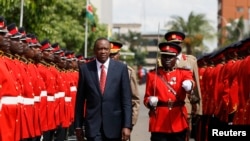The chairman of the Kenya National Union of Teachers (KNUT) says his group’s members want a “sensible” commitment from the government to meet their demands for improved living conditions.
Wilson Sossion says previous governments have failed to meet teachers’ demand for improved conditions despite of repeated promises.
The teachers group demands payment of allowances set out in a 1997 collective bargaining agreement with the government, which amounts to shillings 41 Billion [$478,692,630].
“To indeed see any further progress with the government we want sensible commitment of our demands which have been pending for the last 16 years. Otherwise, we are not prepared to go for unproductive talks with the employer, the Teachers Service Commission [TSC],” said Sossion. “If government allocates money with the Teacher Service Commission, that is when we can move to engage in negotiations.”
Kenya’s deputy president, William Ruto, directed the TSC to urgently convene a meeting with the KNUT to avert a looming strike. Mr. Ruto says his administration would not want the teachers to embark on another round of strikes, saying that would negatively affect students.
But, Sossion says the teachers do not trust the government’s directive. He says the group is tired of empty promises.
“That is a loose directive [and] it’s not a productive directive to us,” Sossion said. “The deputy president should have directed the treasury to release money to the TSC. If that was done, fine, then we would go for negotiations.”
Sossion says members want to go on strike if the administration refuses to allocate funds to meet their demands.
“If government stays put and insists with its current position, then they can be very sure in the coming days we would be out on strike because we can’t allow this kind of business to go on for years where agreements are not honored and the teaching service is deteriorating over time, [and] teachers continue to suffer,” said Sossion.
Supporters of the government say the new administration needs time to resolve teachers’ concerns. Sossion disagreed.
“We are dealing with the government. We are not dealing with individuals. Even if we were, the same individuals have been in government and they have been cabinet secretaries so they are very much aware. So it is not a new thing,” said Sossion.
Sossion was talking about both President Uhuru Kenyatta, who was a former finance minister, and Deputy President Ruto, who was a former minister for Higher Education.
Wilson Sossion says previous governments have failed to meet teachers’ demand for improved conditions despite of repeated promises.
The teachers group demands payment of allowances set out in a 1997 collective bargaining agreement with the government, which amounts to shillings 41 Billion [$478,692,630].
“To indeed see any further progress with the government we want sensible commitment of our demands which have been pending for the last 16 years. Otherwise, we are not prepared to go for unproductive talks with the employer, the Teachers Service Commission [TSC],” said Sossion. “If government allocates money with the Teacher Service Commission, that is when we can move to engage in negotiations.”
Kenya’s deputy president, William Ruto, directed the TSC to urgently convene a meeting with the KNUT to avert a looming strike. Mr. Ruto says his administration would not want the teachers to embark on another round of strikes, saying that would negatively affect students.
But, Sossion says the teachers do not trust the government’s directive. He says the group is tired of empty promises.
“That is a loose directive [and] it’s not a productive directive to us,” Sossion said. “The deputy president should have directed the treasury to release money to the TSC. If that was done, fine, then we would go for negotiations.”
Sossion says members want to go on strike if the administration refuses to allocate funds to meet their demands.
“If government stays put and insists with its current position, then they can be very sure in the coming days we would be out on strike because we can’t allow this kind of business to go on for years where agreements are not honored and the teaching service is deteriorating over time, [and] teachers continue to suffer,” said Sossion.
Supporters of the government say the new administration needs time to resolve teachers’ concerns. Sossion disagreed.
“We are dealing with the government. We are not dealing with individuals. Even if we were, the same individuals have been in government and they have been cabinet secretaries so they are very much aware. So it is not a new thing,” said Sossion.
Sossion was talking about both President Uhuru Kenyatta, who was a former finance minister, and Deputy President Ruto, who was a former minister for Higher Education.





